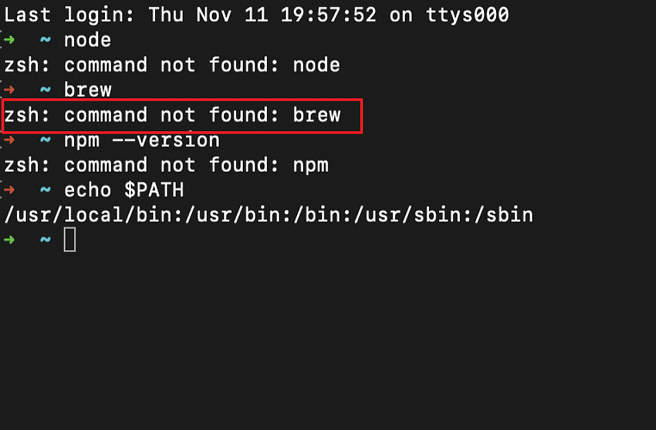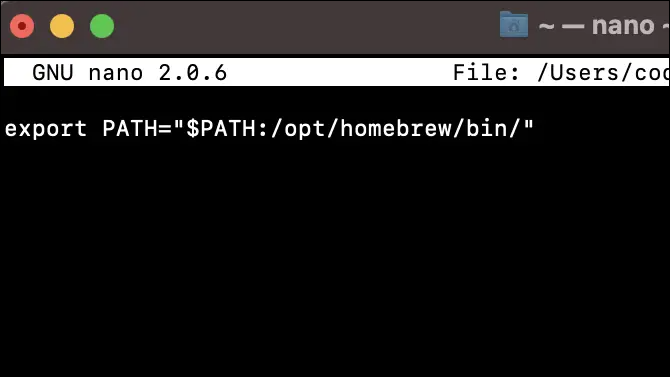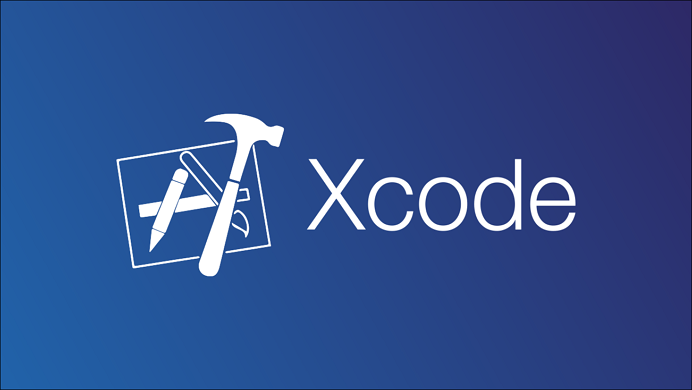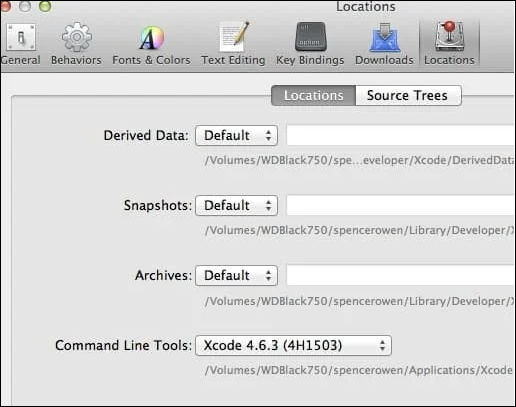When developers forget to install Brew or do not provide the path within the page, the zsh: not found: prepare error command. To fix the “zsh: command not found: brew” issue, check the quick navigation:
The command line interface (CLI) and interpreter for the collection of commands used to communicate with the operating system are known as shell
.
Every Unix-based operating system has a preferred package manager, and Homebrew is that package manager on macOS. However, while package managers make managing and installing various tools on your computer incredibly simple, they occasionally encounter issues like zsh command not found, zsh: command not found: npm, and zsh: command not found: node.
In this article, we will talk especially about the “zsh: command not found: brew” error.

First Aid: Recover Data Deleted by
Terminal on Mac
A significant use of Terminal on Mac is to delete or recover files. Sometimes, you find that your zsh command is not found due to unintentional deletion. Therefore, recovering deleted files on Mac Terminal is unreliable because the downloaded file was faulty or broken. Thus, Mac users may find that their important files or data disappear once Terminal recovery is done.
Otherwise, your files and data might be lost if the zsh tools were updated by mistake or the commands were given incorrectly. Therefore, it would be advantageous if you were careful when protecting your data. Here is an excellent Mac Trash recovery program to recover data – EaseUS Data Recovery Wizard for Mac.
If you don’t know how to use the Terminal command line
- and don’t have a Time Machine backup, this is your best option. When a system crash or virus attack causes your files to be lost, you can recover permanently deleted files on Mac. Files deleted using Terminal command line can also be recovered with the help of EaseUS Data Recovery Wizard for Mac. 👌
- 🦠
- 📄
Check the steps and learn how to use the software to recover deleted files on your Mac
.
Step 1. Select the drive you want to scan
In the primary window of the EaseUS Data Recovery Wizard, there will be a list of the drives connected to your Mac. Select the drive from which you need to recover lost/deleted files and click the “Find Lost” button.
Step 2. Select Your Lost Data/Files
EaseUS Data Recovery Wizard for Mac will immediately scan the selected disk volume and display the scan results on the left panel. You can sort the results to find the desired files if you are looking for certain files.
Step 3. Recover Lost/Deleted Data
Once you have found the desired files, preview the files and then click “Recover” to begin the recovery of your deleted/lost Mac files
.
How to Fix Zsh: Command Not Found: Brew on Mac
Homebrew or Brew, sometimes known as Brew, is an open-source package manager for Linux and macOS. You can download, install, update, and uninstall packages using its easy-to-use command line interface. In this part, we will learn how to fix the “zsh command not found brew” error on Mac, which may appear when you run the brew command with Terminal.
Before starting the 5 fixes, check out the following video tutorial first. Provides more details about the method to fix the Zsh command not found brew error.
Read the solutions below if you still have questions about how to fix the problem.
- Solution 1. Reinstall Zsh Brew
- Fix 2. Add Brew to the
- Fix 3 path variable. Fix the Homebrew 4 installation solution
- . Install the Arm version on M1 Mac
- Fix 5. Install Xcode on Mac
Fix 1. Reinstall the Zsh Brew
The best course of action is to uninstall the Homebrew program, then reinstall it if it doesn’t work as planned. Open the terminal on your Mac and type the following command if you want to uninstall the “Homebrew” software without leaving any cache:
The official developers of the Homebrew project provide this command on Github
.
Restart the computer after completely uninstalling the Homebrew program. Then go to the Homebrew website now and then paste the installation code there:
The
command line is changed to /bin/bash because the Homebrew was rewritten on the “Bash” platform instead of Ruby
.
Workaround 2.Add
Preparation to Path
Variable Preparation will automatically add the installation directory to the path after installation. Unfortunately, this might not work occasionally, and you’ll have to add the guide manually to fix the zsh: not found: preparation error command.
For Bash
:
Use the following command to accomplish this:
Replace the destination directory with /usr/local/bin if Homebrew is installed in a different location. For example, preparation is installed in /opt/homebrew/bin on macOS.

For Zsh –
Similarly, you can replace the destination directory with /usr/local/bin
.
Executing the command
.
It will demonstrate that the brew command was successfully executed
.
You can now access Homebrew from your terminal session after successfully installing it.
Although the above method of running the brew command will work on Mac, it is preferable to add the brew installation location to the .zshrc file.
Using the nano /.zshrc command, open the .zshrc file.
- Now add the following line to the .zshrc file. “$PATH:/opt/homebrew/bin” is the export path.
- By pressing Ctrl + X and Enter, you can save the file
- Use source /.zshrc to apply the modifications.
.
Solution 3. Fix Homebrew
installation
You must run these commands independently in the terminal to fix the installation
.
Step 1. Open Terminal on Mac.
Step 2. Type export PATH=”/opt/homebrew/bin:$PATH” in the terminal and press Return.
Step 3. Type this command in the terminal and press return: export PATH=”/opt/homebrew/bin:$PATH”‘ >> $HOME/.zshrc
After these commands, you won’t see anything, which is great. Type the command “brew help” right now to verify that everything is fine and that Homebrew is working.
<img src
=”https://www.easeus.com/images/en/screenshot/data-recovery-mac/homebrew-social-card.png” alt=”Mac Homebrew zsh command” />
Fix 4.Install Arm Version
on M1 Mac
If you are using a Mac with an Apple M1 chip, your device will display a message instructing you to add brew to the zsh .zprofile configuration file.
You must install Homebrew in /
opt/Homebrew instead of /usr/local/homebrew . To install the ARM version of Homebrew on your M1 device, enter the following code
: [email protected] ~ % /bin/bash -c “$(curl -fsSL https://raw.githubusercontent.com/Homebrew/install/HEAD/install.sh)” … ==> Next steps: – Add Homebrew to your PATH in /Users/668/.zprofile: echo ‘eval $(/opt/homebrew/bin/brew shellenv)
- ‘ >> /Users/
- 668/.zprofile
- eval $(/opt/homebrew/bin/
- )
- –
- Run ‘brew help’ to get started
- Additional documentation: https://docs.brew.sh
- [email protected] ~ % brew install -cask google-chrome zsh: command not found: brew
brew shellenv
–
It is recommended to read each line before copying and pasting thoroughly
.
Solution 5. Install
Xcode on Mac
Most Mac users have complained that without Xcode installed on the machine, the Homebrew software will not run. As a result, you should have Xcode installed on your system.

To do this, follow these instructions:
Step 1. To find out if XCode is already installed on your machine or not, use the following command:
Step 2. If XCode is already installed on your Mac, you can identify the specific version by looking for something like this:
Step 3. Open Xcode now, then go to Preference Location. This option can be found in the “Command-Line Tools” section.

Step 4. Open the terminal, and then run the following command
:
If one of the above fixes is helpful in resolving the zsh: command not found: brew issue, please share it on Facebook, Twitter, Instagram, and other social media platforms! Zsh: Command Not Found: Prepare
Error Occurs, Why The most apparent reason for the problem, as indicated by the
error message,
is
that Brew is not installed or the existing installation is corrupted or faulty
.
Systems have a list of folders to search for binaries of a command. Thus, your system encounters the “zsh command did not find brew,” and zsh permission denied issue when it cannot locate the brew binary in its path.
Therefore, when you issue a command from your terminal, the system will go through this directory list for the binary with that name. The “command not fouTerminal error message will be returned if the system cannot locate a binary with that name.
The PATH environment variable contains the list of directories that the system will search.
In addition, additional typical causes include:
- ❗The PATH variable no longer contains the brew binary
- The downloaded file was faulty or broken. Improper installation of Homebrew. 📁
- 🔨
.
Conclusion
The two options for the default Mac shell are Zsh and bash. However, since macOS Catalina, Apple switched from zsh to bash, partly because bash is now subject to the GPL v3 license, which is incompatible with Apple’s rules, and zsh is more functionally equivalent to the ordinary party.
Ultimately, the path change and incorrect installation caused the “Zsh command not found: brew” issue. We hope the methods below are helpful if you recently rectified your download and put your preparation files back on the right track. Moreover, EaseUS Data Recovery Wizard for Mac can work well with your Mac devices to protect your data.
FAQs
of zsh command not found
Brew After learning how to fix Mac zsh command not found brew, you might have more questions about it. See if you can find their answers here:
1. How do I fix zsh command not found error on Mac? To fix zsh error
, you can try 5 methods below. To read more, you can click on the linked page on how to fix Zsh: command not found.
- Establish $Path environment
- Make sure the package is installed
- Check the syntax
- Set path in the .zshrc file
- Reinstall macOS
2. What is Zsh Shell on Mac?
Macs have a Unix shell called Zsh. It is a command-line shell scripting tool that combines Bash, Tcsh, and Ksh functionalities. It refers to an improved extended Bourne projectile. In addition, we recommend setting up a different API to handle its complex configuration.
3. What is brew command on Mac?
Homebrew (brew command) is a crucial package manager for macOS programmers, system administrators, and advanced users. We can use Homebrew to install the latest and improved versions of widely used programs, packages, and development tools.
4. How to open Zsh terminal on Mac?
Step 1. Open Mac’s Dock and click the Launchpad icon.
Step 2. In the field, type “Terminal.”
Step 3. Choose Terminal.
Step 4. Run it by typing “Zsh”.

